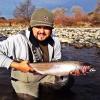 Redux....
Redux....
Just to mention that we shouldn't confuse genetics with environmental conditions or other external factors....
" Originally Posted by DAVID95670
this is incorrect, genetic make up will not change how you spawn, nature prevails. I have no idea how this idea has ever taken hold. animals will spawn it is inate, and as a geneticist it is simple DNA is DNA there are no spontaneous recurring mutations when raised in a holding tank then released ..."
" Fish Guru
Gonna have to disagree with you on multiple fronts here David. Many studies have been done that scientifically disagree with what you are saying. Also, when you mix in a strain of fish that is not native to a particular watershed why is it that In order to keep them there man has to keep stocking them? If what you're saying about genetic makeup and DNA were true, then these non native hatchery fish would adapt and become a naturally occurring part of rivers where they are stocked, but it's just not happening."
Fish Guru,.... If you could provide a link to any of these "Many studies...." you mention I would appreciate it. I'm not saying they don't exist, just can't find any. A link(s) would help.
I'm not aware of any studies that say that contradict Davids assertion that, "....there are no spontaneous recurring mutations when raised in a holding tank then released ..." Not a geneticist, but I believe David is correct on this. Gotta add/subtract some genetic material to cause a mutation. Neither does genetic make-up dictate where a fish will spawn. At a high level, genetic make-up determines if something is a fish and of what type, sex, etc. Fish live, breath/feed and reproduce in water. They produce eggs/milt in order to procreate. That's a strategy for procreation. Genetic make-up doesn't dictate where in a watery environment spawning will take place. Just that it takes place.
"Fish Guru (again)
Also, when you mix in a strain of fish that is not native to a particular watershed why is it that In order to keep them there man has to keep stocking them? If what you're saying about genetic makeup and DNA were true, then these non native hatchery fish would adapt and become a naturally occurring part of rivers where they are stocked, but it's just not happening."
Skamania Steelhead (a desirable, naturally spawning fish) were distributed over several watersheds where they were non-native long ago. According to Shawn Kempkes in a prior post, their genes were no longer as widely distributed as some have said they are. Could that be due to genetic mixing, habitat loss, straying, fishing pressure??? Who can say. At any rate, they're not restocked to maintain their genetic integrity.
IMO, Adaption/survival rates for hatchery reared fish after introduction are probably more impacted by external factors than DNA. Along that line of thinking, maybe a large number of hatchery reared fish do survive to become natural spawners. The Idaho study would appear to say that they don't. But that was on resident brooks/rainbows and still doesn't change the fact that there're so many fisherman pounding the Rivers/streams of this state, that one of many reasons hatchery reared fish (and natives for that matter) are not surviving in numbers is that they're caught and removed. Maybe their habitat is so screwed up that they're unable to survive. Then there's then issue of predation and we haven't even began to touch on oceanic conditions.... Too easy to say that they're "....exponentially inferior."
Last edited by Darian; 02-16-2013 at 10:43 PM.
"America is a country which produces citizens who will cross the ocean to fight for democracy but won't cross the street to vote."
Author unknown





 Reply With Quote
Reply With Quote




Bookmarks